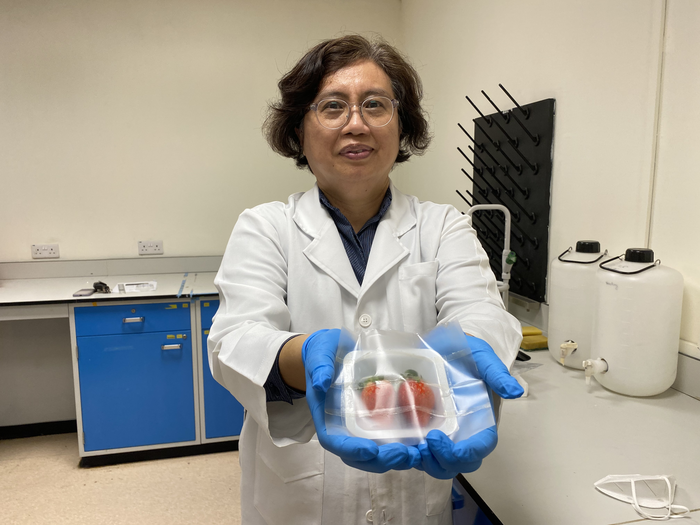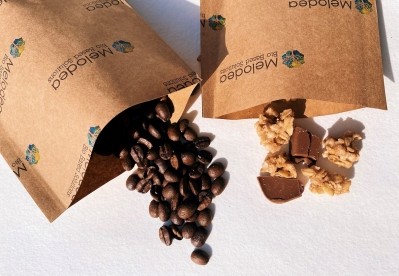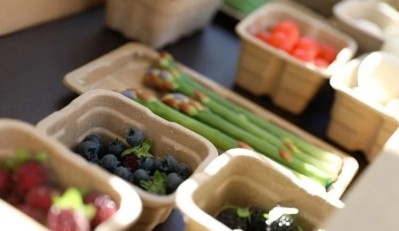'Smart' food packaging? Scientists unveil biodegradable food packaging made from corn protein

Scientists from Harvard T.H. Chan School of Public Health and Nanyang Technological University, Singapore (NTU Singapore), explained that their plant-based waterproof packaging made from a corn protein called zein is designed to release "necessary miniscule amounts of antimicrobial compounds" only in response to the presence of additional humidity or bacteria ensuring that the packaging can endure several types of exposure environments and last for several months, explained researchers whose findings were published in the peer-reviewed academic journal ACS Applied Materials & Interfaces.
“Food safety and waste have become a major societal challenge of our times with immense public health and economic impact which compromises food security. One of the most efficient ways to enhance food safety and reduce spoilage and waste is to develop efficient biodegradable non-toxic food packaging materials," said Philip Demokritou, adjunct professor of environmental health at Harvard Chan School and director of the Nanotechnology and Nanotoxicology Center and co-director of NTU-Harvard Initiative on Sustainable Nanotechnology, who co-led the study.
"In this study, we used nature-derived compounds including biopolymers, non-toxic solvents, and nature-inspired antimicrobials and develop scalable systems to synthesize smart antimicrobial materials which can be used not only to enhance food safety and quality but also to eliminate the harm to the environment and health and reduce the use of non-biodegradable plastics at global level and promote sustainable agri-food systems.”
'Smart release' of natural antimicrobials
To test the efficacy of the novel food packaging, the scientists conducted several experiments, exposing it to an increase in humidity or enzymes from harmful bacteria. In such instances, the fibers in the packaging have been shown to release the natural antimicrobial compounds (such as oil from thyme), killing common bacteria that contaminate food, such as E. Coli and Listeria, as well as fungi, noted researchers.
In one experiment, strawberries that were wrapped in the packaging stayed fresh for seven days before developing mold, compared to counterparts that were kept in mainstream fruit plastic boxes, which stayed fresh for four days.
"The smart release of antimicrobials only when bacteria or high humidity is present, provides protection only when needed thus minimizing the use of chemicals and preserving the natural composition of foods packaged,” said professor Mary Chan, director of NTU’s Center of Antimicrobial Bioengineering, who co-led the project.
Food industry adoption and applications
The packaging has the potential to be used on a wide variety of fresh food products including ready-to-eat foods, raw meat, fruits, and vegetables, Chan added.
ComCrop, a Singapore-based urban rooftop farming company, has already taken interest in the packaging technology.
“The NTU-Harvard Chan School food packaging material would serve as a sustainable solution for companies like us who want to cut down on the usage of plastic and embrace greener alternatives. As ComCrop looks to ramp up product to boost Singapore’s food production capabilities, the volume of packaging we need will increase in sync, and switching to a material such as this would help us have double the impact," said ComCrop CEO Peter Barber.
"The wrapping’s antimicrobial properties, which could potentially extend the shelf life of our vegetables, would serve us well. The packaging material holds promise to the industry, and we look forward to learning more about the wrapping and possibly adopting it for our usage someday.”
The team of NTU and Harvard Chan School researchers hope to scale up their technology with an industrial partner, with the aim of commercialization within the next few years. They are also currently working on other technologies to develop biopolymer-based smart food package materials to enhance food safety and quality.
“Due to the globalization of food supply and attitude shift towards a healthier lifestyle and environmentally friendly food packaging, there is a need to develop biodegradable, non-toxic and smart/responsive materials to enhance food safety and quality. Development of scalable synthesis platforms for developing food packaging materials that are composed of nature derived, biodegradable biopolymers and nature inspired antimicrobials, coupled with stimuli triggered approaches will meet the emerging societal needs to reduce food waste and enhance food safety and quality," added Demokritou.


















